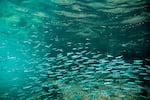
A new rule prohibits new fisheries on forage fish species including silversides, shown here.
Paul Asman and Jill Lenoble/Flickr
West Coast fishery managers adopted a new rule Tuesday that protects many species of forage fish at the bottom of the ocean food chain.
The rule prohibits commercial fishing of herring, smelt, squid and other small fish that aren't currently targeted by fishermen. It sets up new, more protective regulations for anyone who might want to start fishing for those species in the future.
The Pacific Fishery Management Council unanimously voted to adopt the rule at a meeting in Vancouver, Washington. The council sets ocean fishing seasons off the coasts of Washington, Oregon and California.
The idea behind the new rule is to preserve so-called forage fish so they're available for the bigger fish, birds and whales that prey on them. It's part of a larger push by the council to examine the entire ocean ecosystem when setting fishing seasons.
Environmentalists who have been advocating for the rule for years celebrated the approval.
"If we're going to have a healthy ocean ecosystem in the long term, we have to protect that forage base," said Ben Enticknap of the environmental group Oceana. "These are the backbone of a healthy ocean ecosystem."
Enticknap said many of the forage fish subject to the new rule are already being fished elsewhere in the world. Little fish at the bottom of the food chain are used to make fish meal for aquaculture, and they're increasingly in demand as food for people as other fish populations decline.
Previous rules only required managers to be notified of a new fishery on non-managed forage fish species. Now, the council will require a more rigorous scientific review to prove that the new fishery won't harm the ecosystem before it is allowed.
"Really, it's being precautionary," said Enticknap. "It's getting out ahead of a crisis rather than waiting for a stock to collapse and then having to have serious consequences for fisheries after the fact."
The rule has gained broad support -- even from the fishing industry, according to Steve Marx of the Pew Charitable Trusts. Valuable commercial fish such as rockfish, salmon, halibut and tuna all prey on forage fish.
"The fishing industry support has been pretty strong because everybody understands how important these small forage fish are to the fish they like, that they make a living off of," he said.
Rod Moore, executive director of the West Coast Seafood Processors Association, congratulated the council on moving forward with the rule.
"It's rare to get this sort of consensus support from commercial, environmental and recreational sectors, and I think you have it on this one," he said.
Before voting, council members discussed the best way to allow existing fisheries to catch some of the forage fish species incidentally – as they're targeting other fish.
The council directed staff to continue developing the details of the rule so that it doesn't constrain existing fisheries, but it does discourage fishing boats from targeting forage fish.
Councilors instructed staff to hold fishing boats accountable the forage fish they catch and consider discouraging development of at-sea processing of forage fish species into fish meal.
